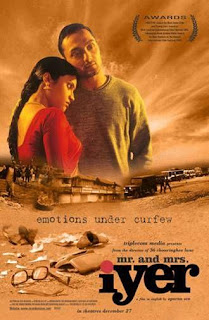AFED #86: Mr. and Mrs. Iyer (India/US, 2002); Dir. Aparna Sen
Although Bollywood cinema has risen in prominence in the west in recent years, the independent tradition, what's known as the Indian New Wave or Parallel Cinema, has a history that's nearly as long as its mainstream counterpart.
Its most famous exponent is of course Satyajit Ray, whose Apu Trilogy remains one of the great landmarks of world cinema. But the independent tradition of making films that don't shy away from contemporary concerns and divisive issues continues - despite some ups and downs - to the present day.
Released in 2002, Mr. and Mrs. Iyer, is an example of the more recent trend towards films made in English, presumably with an eye towards the international market. This perhaps accounts for some of its mildly expository tendencies, but that doesn't detract from a touching and sensitively told melodrama.
A road movie of sorts, it's the story of Meenakshi Iyer, a young Indian mother travelling with her baby son back to the city after a trip to visit her parents, and Raju (Rahul Bose), a photographer taking the same trip who's been asked to keep an eye on her. When their journey is halted by a Hindu mob who've been rampaging through the area attacking Muslims, the pair are forced to pretend to be a married couple for fear that Raja, a Muslim, will die at their hands.
After seeking refuge at a nearby town while the curfew continues, circumstances contrive so that the 'couple' are forced to maintain the subterfuge. After some early misgivings borne of Meenakshi's devout Hindu beliefs, their relationship slowly grows midst the tense backdrop, until they're finally able to find a way back home.
It's a scenario straight out of the scriptwriter's handbook of course, and a not dissimilar plot was used in last year's Monsters. The crucial difference here being that the atrocities the characters are forced to confront here are firmly grounded in the sectarian troubles of contemporary India.
Writer/director Aparna Sen is clearly keen to make wider allusions to global terrorism and the horrors that result from ideological conflict; beginning with a montage of news reports including 9/11 (at the time of production still very recent). Yet it it's in her depiction of different facets of Indian society that she does her best work.
For the opening thirty minutes she simply focuses on the different characters on the bus: a group of excitable young students, a romantic young couple, a pair of Sikh gentlemen, a mother with a retarded son, a trio of boorish card playing characters and an ill-fated elderly Muslim couple. They're ostensibly a collection of stereotypes, but considering how little actually happens it's strangely compelling viewing and a little disappointing when these personalities slip into the background later on.
The budding romance between the two leads is inevitably thwarted by their personal circumstances and the gut-wrenching final parting at the train station is surely a deliberate nod to Brief Encounter. Of the two performances the pretty Konkona Sen Sharma (the director's real-life daughter) has the trickier role as the young woman forced to confront her own prejudices and she delivers with aplomb.
As a human drama it's engagingly told and although the broader political message may be rather heavy-handed most sensible people would surely concur with the sentiment.
Its most famous exponent is of course Satyajit Ray, whose Apu Trilogy remains one of the great landmarks of world cinema. But the independent tradition of making films that don't shy away from contemporary concerns and divisive issues continues - despite some ups and downs - to the present day.
Released in 2002, Mr. and Mrs. Iyer, is an example of the more recent trend towards films made in English, presumably with an eye towards the international market. This perhaps accounts for some of its mildly expository tendencies, but that doesn't detract from a touching and sensitively told melodrama.
After seeking refuge at a nearby town while the curfew continues, circumstances contrive so that the 'couple' are forced to maintain the subterfuge. After some early misgivings borne of Meenakshi's devout Hindu beliefs, their relationship slowly grows midst the tense backdrop, until they're finally able to find a way back home.
It's a scenario straight out of the scriptwriter's handbook of course, and a not dissimilar plot was used in last year's Monsters. The crucial difference here being that the atrocities the characters are forced to confront here are firmly grounded in the sectarian troubles of contemporary India.
Writer/director Aparna Sen is clearly keen to make wider allusions to global terrorism and the horrors that result from ideological conflict; beginning with a montage of news reports including 9/11 (at the time of production still very recent). Yet it it's in her depiction of different facets of Indian society that she does her best work.
For the opening thirty minutes she simply focuses on the different characters on the bus: a group of excitable young students, a romantic young couple, a pair of Sikh gentlemen, a mother with a retarded son, a trio of boorish card playing characters and an ill-fated elderly Muslim couple. They're ostensibly a collection of stereotypes, but considering how little actually happens it's strangely compelling viewing and a little disappointing when these personalities slip into the background later on.
The budding romance between the two leads is inevitably thwarted by their personal circumstances and the gut-wrenching final parting at the train station is surely a deliberate nod to Brief Encounter. Of the two performances the pretty Konkona Sen Sharma (the director's real-life daughter) has the trickier role as the young woman forced to confront her own prejudices and she delivers with aplomb.
As a human drama it's engagingly told and although the broader political message may be rather heavy-handed most sensible people would surely concur with the sentiment.




Comments
Post a Comment